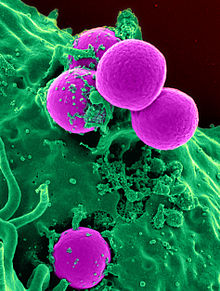
Back مكورات عنقودية ذهبية مقاومة للميثيسيلين Arabic Метицилин-резистентен стафилокок Bulgarian Staphylococcus aureus resistent a la meticil·lina Catalan Meticilin-rezistentní zlatý stafylokok Czech Staphylococcus aureus ymwrthiol i fethisilin Welsh MRSA Danish Staphylococcus aureus resistente a la meticilina Spanish Metitsilliinile resistentne Staphylococcus aureus Estonian استافیلوکوکوس اورئوس مقاوم به متیسیلین Persian MRSA Finnish

Methicillin-resistant Staphylococcus aureus (MRSA) is a group of gram-positive bacteria that are genetically distinct from other strains of Staphylococcus aureus. MRSA is responsible for several difficult-to-treat infections in humans. It caused more than 100,000 deaths worldwide attributable to antimicrobial resistance in 2019.
MRSA is any strain of S. aureus that has developed (through natural selection) or acquired (through horizontal gene transfer) a multiple drug resistance to beta-lactam antibiotics. Beta-lactam (β-lactam) antibiotics are a broad-spectrum group that include some penams (penicillin derivatives such as methicillin and oxacillin) and cephems such as the cephalosporins.[1] Strains unable to resist these antibiotics are classified as methicillin-susceptible S. aureus, or MSSA.
MRSA infection is common in hospitals, prisons, and nursing homes, where people with open wounds, invasive devices such as catheters, and weakened immune systems are at greater risk of healthcare-associated infection. MRSA began as a hospital-acquired infection but has become community-acquired, as well as livestock-acquired. The terms HA-MRSA (healthcare-associated or hospital-acquired MRSA), CA-MRSA (community-associated MRSA), and LA-MRSA (livestock-associated MRSA) reflect this.[citation needed]